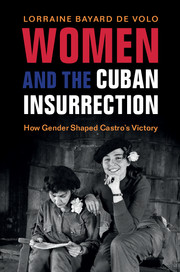Book contents
- Women and the Cuban Insurrection
- Women and the Cuban Insurrection
- Copyright page
- Dedication
- Contents
- Preface
- 1 Revolution Retold
- 2 “How Can Men Tire When Women Are Tireless?”
- 3 A Movement Is Born
- 4 Abeyance and Resurgence
- 5 Gendered Rebels
- 6 War Stories Celebrated and Silenced
- 7 “Stop the Murders of Our Children”
- 8 Masculinity and the Guerrilla War of Ideas
- 9 Women Noncombatants
- 10 Las Marianas
- 11 Past Is Prologue
- Bibliography
- Index
8 - Masculinity and the Guerrilla War of Ideas
Published online by Cambridge University Press: 19 January 2018
- Women and the Cuban Insurrection
- Women and the Cuban Insurrection
- Copyright page
- Dedication
- Contents
- Preface
- 1 Revolution Retold
- 2 “How Can Men Tire When Women Are Tireless?”
- 3 A Movement Is Born
- 4 Abeyance and Resurgence
- 5 Gendered Rebels
- 6 War Stories Celebrated and Silenced
- 7 “Stop the Murders of Our Children”
- 8 Masculinity and the Guerrilla War of Ideas
- 9 Women Noncombatants
- 10 Las Marianas
- 11 Past Is Prologue
- Bibliography
- Index
Summary
This chapter covers the rise of guerrilla warfare in 1957–58 and begins an inquiry into how guerrilla warfare was gendered. After an overview of the shift in command from the llano to the Sierra, it turns to how the guerrilla war was waged and won, arguing for the important role of the rebels' hearts and minds campaign. Despite the Cuban War Story's near-exclusive celebration of guerrilla military engagements, echoed in more muted tones in much of the literature, I show how the guerrillas relied upon a gendered war of ideas that both exploited military weaknesses and attracted popular support.
The rebels pursued several tactics in this struggle for hearts and minds. On the basis of sheer numbers, weapon power, supplies, and training, Batista soldiers appeared to comprise the superior military and express hegemonic masculinity. But rebel rhetoric challenged these soldiers' masculinity, representing instead the rebels – ragtag, poorly armed, and not formally trained – as the superior men. Rebels also divided the Batista military from within, distinguishing between most soldiers, who were men of honor, and Batistianos, who were men without honor – indeed, corrupt rapists and assassins. M-26-7 dealt swiftly and harshly with accused rapists and positioned itself as the army that did not rape, which I argue was an important means of winning civilian support. As Fidel Castro's star rose, it too was tied to gender, and he performed machismo to increasing acclaim. Representations of Celia Sánchez served as the feminine rebel ideal against which Fidel's masculinity has been measured and celebrated.
M-26-7 Guerrillas and the April Strike
Once the small group of Granma survivors reached the relative safety of the mountains in late 1956, they set about gaining support among the local population. Bonachea and San Martín note the power of Fidel's “mere presence in the Sierra Maestra,” which contributed significantly to his popularity. The Sierra had a considerable advantage over the llano in that the latter, operating clandestinely, had limited ability to rally support. For example, Chicago Tribune reporter Jules Dubois, in the month before Frank País's death, had been unable to interview him “because he was changing hide-outs so frequently that it was dangerous both to him and to me to insist on it.” The guerrillas in the Sierra at this time were more accessible to journalists, and Fidel welcomed them.
- Type
- Chapter
- Information
- Women and the Cuban InsurrectionHow Gender Shaped Castro's Victory, pp. 165 - 188Publisher: Cambridge University PressPrint publication year: 2018



